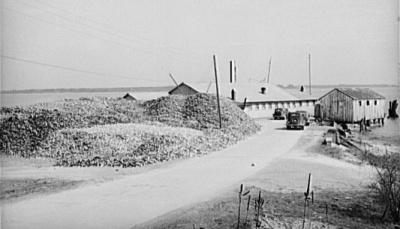
A humungous oyster shuck pile next to an oyster house in Rock Point, Charles County, in April 1941. Years of pollution, disease, and overharvesting have left the local oyster and crab economy in a bad state. (Photo: Reginald Hotchkiss)
ANNAPOLIS (Nov. 20, 2008)—From the time he was a baby in diapers picking clams on his father's boat Puddin, 41-year-old J.R. Gross has worked on the water.
"When I first started - 10, 11, 12-years-old, that was pretty much the boom of it," Gross said. "We had more to do, oysterin' and clammin' - the market was better and there was a lot more of us."
Gross refuses to quit what he calls a way of life, even though a dwindling economy and a struggling blue crab fishery are threatening the livelihood of watermen throughout Maryland and Virginia.
But for now, Gross is among a number of watermen hired as part of Gov. Martin O'Malley's economic mitigation work project, which uses displaced watermen to help restore the bay.
Watermen have been hired by the Department of Natural Resources to clean off the Tolley Point and Sharps Point oyster bar sanctuaries in the Severn River, the Broadneck reserve oyster bar in the Patuxent River and the Evans bar in Tangier Sound. The project began Nov. 17 and runs through Nov. 21.
They are cleaning bars that have been covered by silt and sediment and preparing them for baby oysters, called spat, to be planted in the spring.
The hope is that the baby oysters will survive and reproduce while cleaning up the water. Oysters are crucial to the bay's health because they act as a filter and provide a habitat for other species.
The work mitigation project is not all about oysters. Many watermen will also be working on the land in trail and road maintenance along with other forest management practices in state parks and state forests.
"Anyone who's [oystering] now has got to love it," said 63-year-old Calvin "Pee-Wee" Matthews, who owns the Miss Suzy. Matthews has been a waterman for 40 years and the two have worked alongside each other since Gross started.
Just as the number of watermen have dwindled statewide, so too have the watermen in Gross's family. When he started, he worked with two uncles and at least 15 cousins. Today, he is the last.
Both Gross and Matthews hope the program will help revitalize the dying oyster industry.
We're killing two birds with one stone, said Larry Simms, president of the Maryland Watermen's Association. We're giving watermen work to supplement their income lost from the crabbing regulations and helping DNR [The Department of Natural Resources] to clean up the bay.
Simms was quick to point out that this is not a handout program and that watermen do not want a handout. The hope is they will reap the long-term benefits of this program.
"It's a good program, it really is," said Gross, who stopped harvesting his own oysters to help out even though it means he will be making half of what he would if he were working for himself. "It's not about the money for us, it's about trying to get the bay back to where it needs to be."
Over the years, as the industry has shrunk, Gross dabbled in pile driving and boat carpentry, but he always gravitated back to the water.
When he started out, most of his money was made from clamming.
"Then the clams went and they went completely," he said. "That put more pressure on the oysters." As the oyster population began to decline, more pressure was put on the crabs as watermen turned to crabbing.
Working together, Gross and Matthews have witnessed their livelihood disappear. They've seen good productive bars silt over and have witnessed declining seafood sales.
Gross, who also owns JVE Seafood, has watched the 20-25 bushels that he would catch and sell each week dwindle to seven or eight.
Even during tough times, Gross and Matthews refuse to stop oystering. A friendly rivalry has developed over the years and each day the two would compete to see how many bushels they could catch or how fast they could catch their quota.
Their story is not unique as the struggle to save the oyster has become a vicious cycle. As oysters have been harvested, there have been fewer of them to clean the water and the increasingly polluted water has made it difficult for oysters and other species to survive.
"I'll be oysterin' until the last oysters are caught - I'll drop dead on that boat," said Gross. "You can't get away from it - it's part of you."
"I don't go to the dentist to get stitches and I don't go to the doctor to get a tooth pulled," Gross said. "We're there because we know what we're doing."
Capital News Service contributed to this report.


